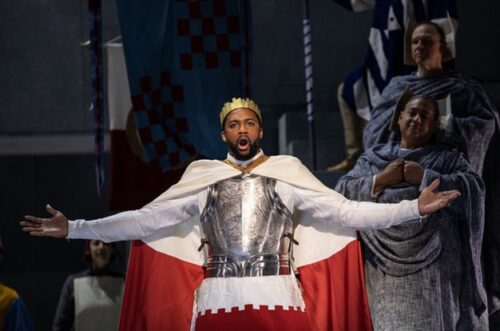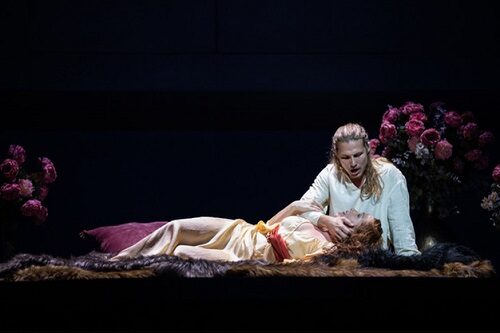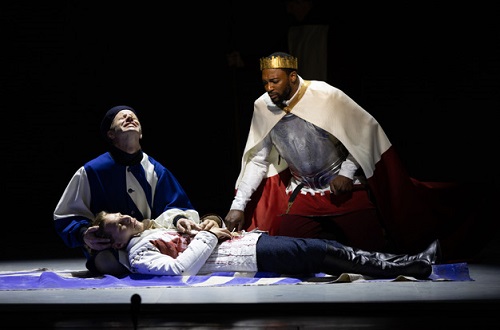 United States Chausson, Le roi Arthus: Soloists, Bard Festival Chorale, American Symphony Orchestra / Leon Botstein (conductor), Bard Summerscape 2021, Fisher Center, Sosnoff Theater, Annandale-on-Hudson, NY, 25.7.2021. (RP)
United States Chausson, Le roi Arthus: Soloists, Bard Festival Chorale, American Symphony Orchestra / Leon Botstein (conductor), Bard Summerscape 2021, Fisher Center, Sosnoff Theater, Annandale-on-Hudson, NY, 25.7.2021. (RP)

Production:
Director – Louisa Proske
Sets – Matt Saunders
Costumes – Kaye Voyce
Lighting – Scott Zielinski
Movement director – Zoe Scofield
Fight choreography – Thomas Schall
Wigs, hair and makeup – Anne Ford-Coates, Annika Seitu
Pageantry design – Jessica Grindstaff, Eric Sanko
Chorus Master – James Bagwell
Cast:
King Arthus – Norman Garrett
Queen Genièvre – Sasha Cooke
Lancelot – Matthew White
Mordred – Justin Austin
Lyonnel – Andrew Bidlack
Merlin – Troy Cook
Allan – Wei Wu
The Laborer – Andres Acosta
Operas fail to earn a place in the repertoire for many reasons. Ernest Chausson’s instant death in a bicycle accident when he was 44 was certainly a factor in the fall of Le roi Arthus into obscurity. Another, undoubtedly, is changing musical tastes: the opera’s stylistic mix of Wagner and late French Romanticism fell out of fashion in the early years of the twentieth century. Saint-Saëns’s Samson et Dalila and two or three of Massenet’s operas were among the rare exceptions to gain and maintain a foothold. All the more reason, then, to celebrate Bard Summerscape’s exciting, powerful production of Chausson’s neglected masterpiece.
Composed between 1886 and 1895, Le roi Arthus premiered in 1903 at the Théâtre de la Monnaie, Brussels. There have been a handful of recordings and one notable revival at the Paris Opera in 2015, but that’s about it. Leon Botstein, the artistic co-director of Bard Summerscape, has long championed the work, recording it with the BBC Symphony Orchestra for Telarc in 2005.
Chausson wrote the libretto as well as the music, and his retelling of the tale would be familiar to anyone who knows the Arthurian legend. His main focus is the illicit love affair between Genièvre and Lancelot, which gives the knight’s rival, Mordred, the opportunity to expose their infidelity to Arthus and usurp the throne.

The king finds it impossible to believe that Lancelot has betrayed him, but when forced to face the truth declares war on him. Genièvre urges Lancelot to fight, but he is wracked with guilt and returns unarmed to the battlefield. Arthus summons Merlin, his childhood mentor, for advice and aid, but the old wizard is unable to change the course of events. With Genièvre having committed suicide by strangling herself with her long locks, Lancelot dead and his life’s work in ruins, Arthus is apotheosized to a legend.
Louisa Proske directed the production. Acclaimed for her innovative work with Heartbeat Opera, Proske is the designated associate artistic director and resident director at Oper Halle in Germany. Her vision for Le roi Arthus was traditional: knights in shining armor, a Genièvre who could have stepped out of a Pre-Raphaelite painting, Arthus brandishing Excalibur, and the Roundtable, the latter of which was central to her concept for the opera.
In the opening scene, it was the table around which Arthus and his knights gathered to celebrate their victory over the Saxons, and where the rivalry between Lancelot and Mordred flared. Later, covered with furs and bedecked with flowers, it became the bed upon which Genièvre and Lancelot consummated their illicit passion. Strewn across the stage in pieces, the table’s final appearance was as the battlefield where the forces of Arthus and Lancelot clashed.
The cast that Botstein assembled was as fine as they come, but tenor Matthew White was a standout. White embodied a dashing knight who acted as much on impulse as honor. His voice blazed as brightly as the sword with which he dueled with Mordred (baritone Justin Austin). It was thrilling to watch the two young men clash swords and leap about the stage.
Baritone Norman Garrett was regal and imposing as Arthus. His voice commanded attention, but it was the nobility of his characterization that resonated so deeply, especially in the final scene when he is swept skywards in a swirl of choristers dressed in white.

In this telling of the Arthurian legend, Genièvre is not the most sympathetic of characters. It is she who woos Lancelot with the drop of a handkerchief; when their liaison is exposed, her first priority is to save herself whatever the cost. Dramatically, mezzo-soprano Sasha Cooke was near perfection in the role. The glory of her voice is its rich middle where, fortunately, much of the roles sits. It did, however, thin noticeably in the higher ranges, thus robbing some climactic moments of their full impact.
The supporting roles were cast with care. Baritone Troy Cook, another compelling singer/actor, instilled Merlin with not only rich resonant tone but a vacuousness that signaled his inability to aid the king. As Lyonnel, tenor Andrew Bidlack was second to none in terms of vocal glamour and created a particularly sympathetic character as Lancelot’s faithful squire. Equally committed performances were given by bass Wei Wu as Allan, Genièvre’s squire, and tenor Andres Acosta, who made the most of his star turn singing a ballad at the beginning of Act II.
Botstein reveled in the beauty of Chausson’s score, leading a fast-paced production both in the pit and on stage. The chorus and orchestra had a few rough patches, but it was an effort to be lauded overall. If you want to lure new audiences into the opera house, there would be few surer bets than this retelling of the legend of King Arthur and the Knights of the Roundtable.
Rick Perdian